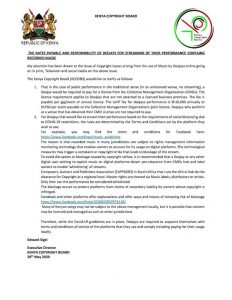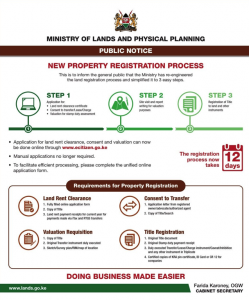Copyright Registration and Enforcement in Kenya 🇰🇪

In Kenya, copyright law is pivotal in safeguarding the rights of creators and encouraging innovation across diverse fields, including literature, music, and the arts. While copyright protection is automatically granted upon the creation of an original work, registering it with the Kenya Copyright Board (KECOBO) and enforcing these rights presents several challenges. This article explores the registration process, highlights recent cases of copyright infringement, and discusses the difficulties in enforcing copyright in Kenya.
The Process of Registering Copyright in Kenya
- Understanding Copyright in Kenya:
Kenya’s copyright protection is governed by the Copyright Act, 2001 (revised in 2019), which outlines the rights of authors and creators over their works. These rights include reproduction, distribution, performance, and public display. Although copyright is automatically conferred upon creation, registering it provides additional legal benefits and serves as evidence in disputes.
- Registration Process:
- Preparation of Materials: To register a work, creators must prepare relevant materials, including a copy of the work, a completed application form, and proof of identity. The work can be in any fixed medium, such as a written manuscript, a recorded performance, or digital content.
- Application Form: The application is submitted to KECOBO, detailing the work, its author, and the nature of the copyright claim. Accurate information is crucial to avoid delays or rejections.
- Submission: Applications can be filed online through KECOBO’s website or in person. Online submissions are recommended for their efficiency.
- Examination: KECOBO examines the application to ensure it meets the requirements. This involves verifying eligibility for copyright protection and the accuracy of the provided details.
- Issuance of Certificate: Upon successful examination, KECOBO issues a registration certificate. While registration is not mandatory, the certificate is valuable as it serves as evidence of copyright and can be critical in legal disputes.
- Fees: Registration involves a fee, which varies based on the type of work and the registration specifics. For the latest fee structure, one should consult KECOBO’s website or contact their office directly.
Challenges in Enforcing Copyright in Kenya
- Infringement and Piracy:
- Prevalence: Copyright infringement, particularly piracy, is a major concern in Kenya. Unauthorized copying and distribution of creative works are widespread. For instance, in recent years Kenyan musicians, including prominent artists such as Nonini (Hubert Nakitare), have experienced issues with unauthorized use of their music on various online streaming platforms. Despite having their works registered, they faced challenges in removing the infringing content and obtaining fair compensation. Nonini has however recently succeeded in enforcing his copyright against a prominent electronics company and digital influencer.
- Legal Framework: Although Kenya’s Copyright Act provides robust protections, enforcing these rights can be challenging. The legal framework needs continuous updates to address emerging issues, particularly in the digital age.
- Enforcement Mechanisms:
- Judicial System: Enforcing copyright often involves navigating Kenya’s judicial system, which can be time-consuming and costly. For instance, the case of renowned author Grace Ogot highlighted the difficulties of legal recourse. Ogot’s works were found being reproduced and sold without her consent. The legal process was prolonged, illustrating the obstacles faced by creators seeking justice.
- Lack of Awareness: Awareness about copyright laws is often limited among the public and even among creators. This lack of understanding can lead to inadvertent infringements and difficulties in asserting copyright claims.
- Resource Constraints:
- Limited Resources: KECOBO and other enforcement agencies often face resource constraints, impacting their ability to effectively monitor and address infringements. For example, KECOBO’s efforts to tackle digital piracy are hindered by limited technological and financial resources.
- Training and Capacity Building: Enhancing the capacity of enforcement agencies and the judiciary through targeted training and increased resources is essential but requires significant investment.
- Digital Challenges:
- Global Nature of the Internet: The global nature of the internet complicates enforcement. For example, in the case of digital content distribution by international platforms, Kenyan copyright holders must often rely on international cooperation to address cross-border infringements effectively.
- Rapid Technological Changes: The fast-paced evolution of technology often outstrips existing copyright laws. The rise of new digital formats and distribution methods requires ongoing updates to legal frameworks and enforcement strategies.
Conclusion
While registering copyright in Kenya is a relatively straightforward process, enforcing these rights poses significant challenges. Recent cases, such as Nonini’s recent copyright infringement win, highlight the need for more effective enforcement mechanisms. Addressing these challenges requires increased awareness, enhanced resources, and international collaboration. By improving these areas, Kenya can better protect its creative sector and support the continued growth of innovation and artistic expression.
*The information in this article does not constitute actionable legal advice. For further information, please contact us via email at info@lehmann.co.ke





